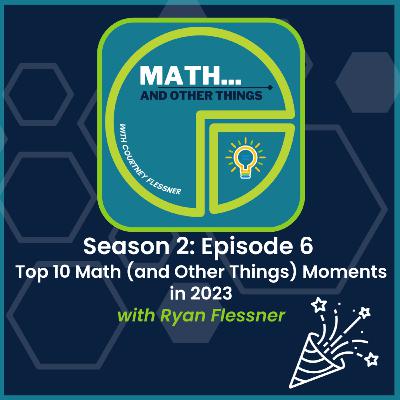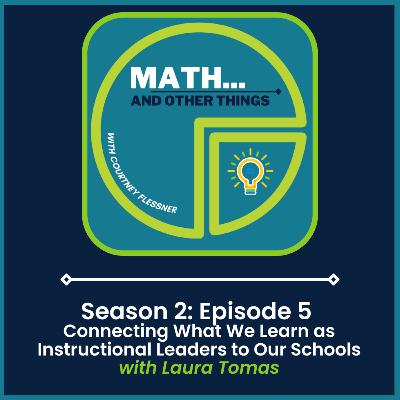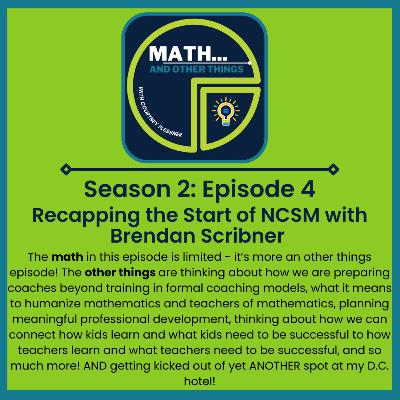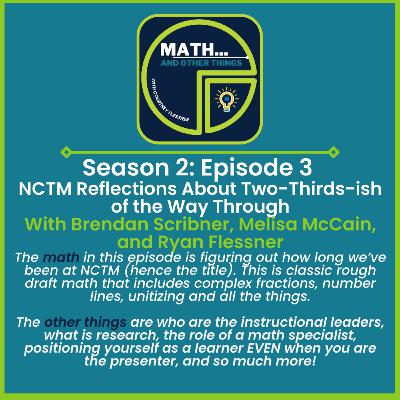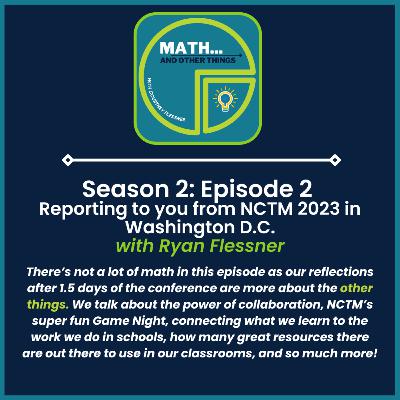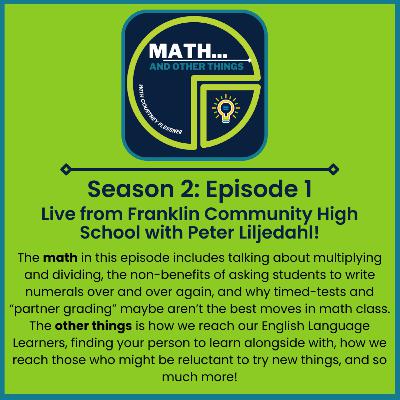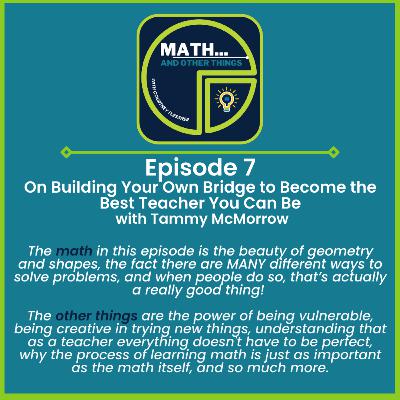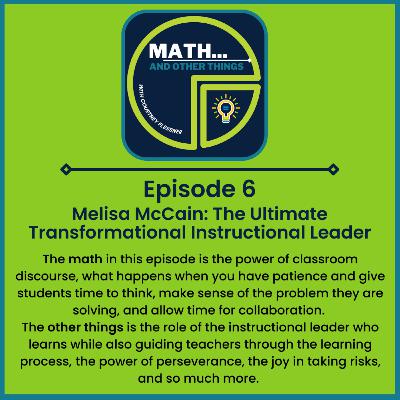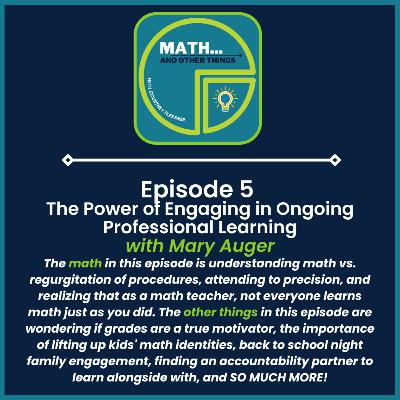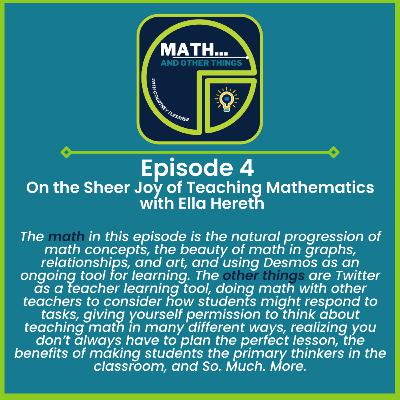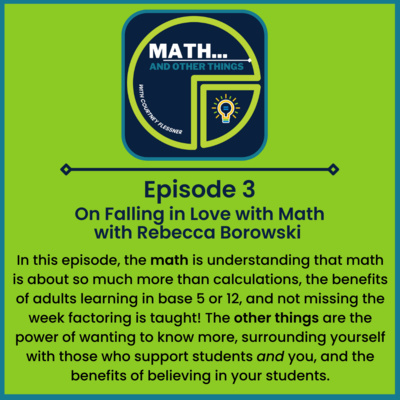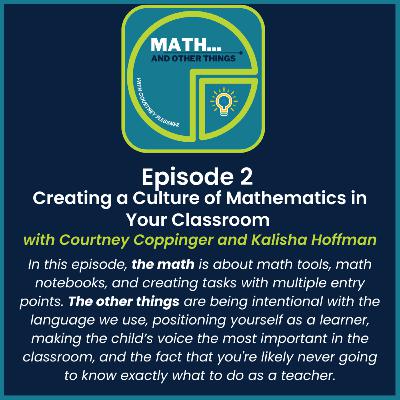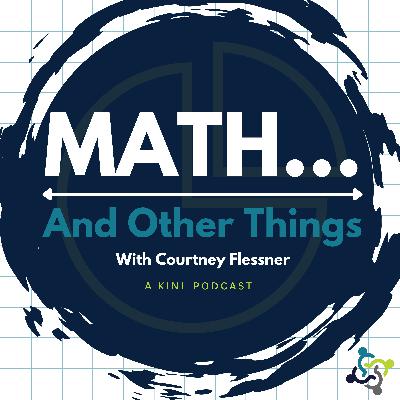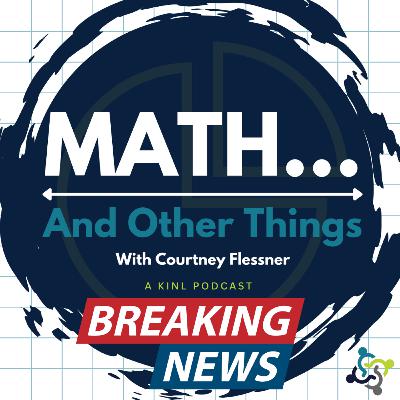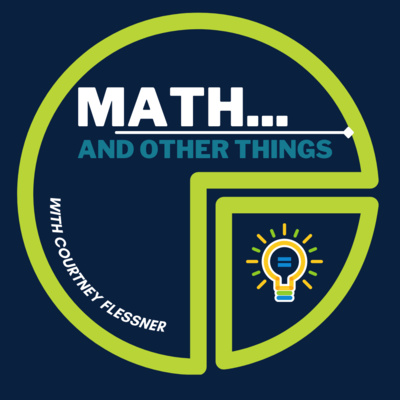Discover Math and Other Things
Math and Other Things

Math and Other Things
Author: Keep Indiana Learning
Subscribed: 5Played: 43Subscribe
Share
© Keep Indiana Learning
Description
Join us as we explore math - and other things with educators and educational thought leaders. In my 28+ years of teaching, I've learned A LOT about teaching, leading, and learning! In an interesting turn of events, I have found a true love in math education, and I'm excited to share what I know - but more importantly what other educators and leaders know about math...and other things!
20 Episodes
Reverse
In this episode Ryan Flessner and I recap our favorite math (and other things) moments of 2023. We talk about people who inspired us, products that inspired us, and it was a lovely time to sit and reflect about our year and realize how incredibly grateful we are to do the work we do and continue to learn side by side with so many different educators. It was a really good year. Tons of math and tons of other things in this jam packed episode! Special thank you to all those listed below who contributed to our incredible year!
@KristenMAcosta
@gfletchy
@drnickimath
@lynseymathed
@TracyZager
@ZanerBloser
@JLMillerIC
@MakeMathMoments
@Mr.Orr_geek
@MathletePearce
@4ryandent
@CFLM_math
@rickwormeli2
@fawnpnguyen
@TammyMcMorrow
@pgliljedahl
@SteveWyborney
@PiBaker18
@KnappMelinda
@MandyMathEd
@SueO’ConnellMath
@JBayWilliams
@MagmaMath
@MagmaMathLeslie
@CELLuindy
@EducateIN
@ButlerCOE
@LauraandKarina
@bscribb
@mccainm
@CloverParkSD
@MathEdLeaders
@NCTM
@IndianaCTM
@pwharris
In this episode, I interview Laura Tomas, an instructional coach from south Florida who I originally met at the Building Thinking Classrooms Conference in June 2023. Laura was one of the facilitators and a volunteer at the conference. She’s been in education for 32 years and simply embraces all she can about the teaching and learning of mathematics and talks to anyone she can to learn more. Her podcast, Learning Through Math is a favorite of mine to listen to. She and her co-host, Karina, interview guests and host a virtual book club. Even after 32 years, Laura realizes she still has so much to learn and jumps at the opportunity to do so.
This episode is a little bit more about the other things in the teaching and learning of mathematics. She tells me three things that stood out to her from the NCTM and NCSM conferences in Washington D.C. this fall, and we talk about how we, as instructional leaders, better understand our roles as coaches and consultants and how we transfer what we learn at conferences to the schools and classrooms for which we are serving. Laura does an awesome job at summarizing her three standout sessions and thinking hard about three specific takeaways from those sessions. We talk about how we are both still learning (or should I say re-learning) math, the importance of developing math identity of ourselves and our students, the fact it is ok to change your answer, the fact we can relate all things math to Ted Lasso, Friends, and Seinfeld, and so much more.
Ted Lasso dart scene
@_CrystalMWatson
@LBrookePowers
@MakeMathMoments
@JohnSanGiovanni
@mathcoachrivera
@JBayWilliams
@joboaler
@SkipFennell
Show Notes:
Live in Washington D.C. where I’m so lucky to have Brendan Scribner joining me for a recap of the first 1.25 days of NCSM 2023. NCSM stands for National Council of Supervisors of Mathematics and you can find everything about them at https://www.mathedleadership.org/. This is an organization that is committed to understanding the role of math leaders, finding ways to connect those who guide teachers through the teaching of mathematics, and this conference is one that I try really hard not to ever miss. This is Brendan’s first NCSM, and he has a lot of thoughtful insight for someone who has just begun providing professional development for teachers, and I enjoyed hearing his take and reflecting on my takeaways, as one who has been working with teachers, coaches, and administrators for several years, while listening to him.
The math in this episode is limited - really we tried to reason why NCTM does not offer lunch options but NCSM does and that has to be because of size. But let’s face it, we are talking about math all the time. Tiles in the bathroom in the shape of a cool parallelogram? We’re talking about it!
The other things are thinking about how we are preparing coaches beyond training in formal coaching models (e.g. Jim Knight), what it means to humanize mathematics and teachers of mathematics, planning meaningful professional development, thinking about how we can connect how kids learn and what kids need to be successful to how teachers learn and what teachers need to be successful, and so much more!
@bscribb
@dh11235
@lynseymathed
@ryanflessner
@mccainm
@MandyMathEd
@LieslMcconchie
Live in Washington D.C. where I’m so lucky to have Brendan Scribner, Melisa McCain, and Ryan Flessner joining me to talk about what we are learning, what’s standing out, what we’re thinking about, and all the things math and the teaching and learning of math. We talk about all the people who are inspiring us, do some very rough draft math, and have a lot of laughs.
The math in this episode is figuring out how long we’ve been at NCTM (hence the title). This is classic rough draft math that includes complex fractions, number lines, unitizing and all the things.
The other things are thinking about who the instructional leaders are, what exactly is research, the role of a math specialist, positioning yourself as a learner EVEN when you are the presenter, and so much more! Enjoy!
@mccain
@bscribb
@MandyMathEd
@TimBrzezinski
@SteveWyborney
@pgliljedahl
@themathguru
@maththerapy
@PiBaker18
@KnappMelinda
@Jeffharker314
@mathgeek76
@jennalaib
@kassiaowedekind
@JLMillerIC
@SkipFennell
In this episode, my partner in life and work, Ryan Flessner and I recap some of our highlights of NCTM 2023 so far. We don’t talk about actual math a lot (although there has been a LOT of conversation about math!) We did, however, talk about lots of other things that are important and impact the teaching and learning of mathematics in our schools. Thoughts that come up:
Appreciating the time to be together and collaborate with others that you don’t work with on a regular basis and the power of having a mix of people in the room from whom you can learn.
How you get to hear from someone that has a big name or big social media presence, but in the audience, you hear about how that connects to the work that’s actually happening in schools.
How fun Game Night was to be a part of this year.
The fact there are so many great resources out there backed by decades of research, and it’s important to know what they are and how they can help you.
What it means to Create, Inspire, and Execute.
It’s important to find your people and learn and grow with them.
@iteachthewhy
@AnnEliseRecord
@MandyMathEd
@drnickimath
@SueOConnellMath
@cjdrake9505
@ZanerBloser
@dave_chwalik
@Wipebook
@MagmaMath
@MagmaMathLeslie
@mccain
@bscribb
@TimBrzezinski
@dave_chwalik
@JamilaDugan
In this episode, we are recording live from the Franklin Community High School Performing Arts Center with Peter Liljedahl. We recorded at the end of the first day of the first ever Building Thinking Classrooms Conference, and we had a great time. Peter told some great stories, was very insightful about how children learn, and provides some unique perspective of how to encourage teachers to try new things in their classrooms - and SO MUCH MORE!
The math in this episode includes talking about multiplying and dividing (we did lots of that at the beginning), the non-benefits of asking students to write numerals over and over again, and why timed-tests and “partner grading” maybe aren’t the best moves in math class. The other things is how we reach our English Language Learners, finding your person to learn alongside with, how we reach those who might be reluctant to try new things, and so much more.
In this episode, I get to talk to Tammy McMorrow who lives in Boise, Idaho and has been teaching first grade for 29 years. She’s a self-described mimicker - and was so good at following rules and doing exactly what she was told to do, she was valedictorian of her class. In this interview she does an incredible job at speaking vulnerably, sharing her learning process, and how she finally found what she was looking for to become the math teacher she wanted to be. In doing so, she has helped thousands of others as she started the Building Thinking Classrooms Facebook group for K-2 which now has over 7,500 members. I’m one of them, and she does an awesome job moderating and collaborating with this group.
The math in this episode is the beauty of geometry and shapes the fact there are MANY different ways to solve problems and when people do so, that’s actually a really good thing!
The other things in this episode are the power of being vulnerable; being creative in trying new things; understanding that as a teacher, everything doesn’t always have to be perfect; why the process of learning math is just as important as the math itself, and so much more.
Books and articles discussed in this episode:
Rigelman, N. R. (2007). Fostering mathematical thinking and problem solving: The teacher’s role. Teaching Children Mathematics, 13(6), 308–314. https://doi.org/10.5951/TCM.13.6.0308
Math is Figureoutable - Pam Harris
The 5 Practices in Practice
Intentional Talk
Productive Math Struggle
Becoming the Math Teacher You Wish You’d Had
Figuring Out Fluency in Mathematics
In this episode, I talk with Melisa McCain, an instructional coach in Franklin Community Schools in Franklin, Indiana. Melisa, has taught grades 1, 3, 4, and 5, and has been a special education teacher and media specialist. She has multiple graduate degrees, and discovered her love of learning at a very young age when, as a child that was “pulled out” to learn math, worked against all the odds to solve a problem none of the kids who got to stay in the room could solve. GO MELISA. Melisa’s love of learning has turned her into a passionate instructional leader and, among other things, helped her discover the book, Building Thinking Classrooms by Peter Liljedahl. When she discovered there was no Building Thinking Classrooms Conference she could get teachers to to further their professional learning on the topic, decided to reach out to Peter and his team and create her own. Melisa is a true leader, an inspired learner, and has a passion for education that, after listening to this episode, will make you want to go out and transform the learning in your school and community.
The math in this episode is the power of classroom discourse, what happens when you have patience and give students time to think, make sense of the problem they are solving, and allow time for collaboration.
The other things is the role of the instructional leader who learns while also guiding teachers through the learning process, the power of perseverance, the joy in taking risks, and so much more.
Resources Referenced in this episode:
Building Thinking Classrooms Conference Page
Indiana Math Leadership Academy Page
Virtually Different Summer Conference
Building Thinking Classrooms in Mathematics, Grades K-12: 14 Teaching Practices for Enhancing Learning
In this episode, I talk with Mary Auger, a middle school math teacher at Hamilton Southeastern Intermediate Junior High. Mary has been teaching for 30ish years and you’ll hear how she has spent her entire career positioning herself as a constant learner. Mary always loved math, but she realized early on that just because the way she was taught worked for her doesn’t mean it will work for all of her students. Because of this very point, Mary has been learning how to get better and better as a teacher each year. Her love of learning is seriously inspirational.
The math in this episode is understanding the importance between actually understanding the math vs. regurgitating procedures, attending to precision, and holding kids accountable for the learning, not just procedures.
The other things in this episode wondering if grades are a true motivator, the importance of lifting up kids’ math identities, back to school night engagement, finding an accountability partner to help you learn how to get better at your craft and so much more!
Resources Referenced in this episode:
First, don’t forget to follow Mary - @MrsAugerMath and, of course, don’t forget to follow @mathandothers!
Building Thinking Classrooms in Mathematics, Grades K-12: 14 Teaching Practices for Enhancing Learning
Teaching Numeracy: 9 Critical Habits to Ignite Mathematical Thinking
#WODB
In this episode, I talk to Ella Hereth, a middle school math teacher in Indianapolis, Indiana. Ella’s my first guest that I randomly emailed because I’ve only really gotten to know her on Twitter! Even though we both live in Indianapolis, our paths don’t cross regularly, but I’m looking to change that in the future! Ella has been teaching for 13 years everything from 7th grade to Pre-Calculus and she continues to grow as a professional trying something new in her classrooms as she learns more about the very best ways to meet the needs of every child. Listening to her talk about successes and struggles in teaching math, the beauty she sees in math, and how she makes connections between art and mathematics is so cool.
The math in this episode is how elementary mathematics connects to secondary math concepts, the beauty of math in graphs and relationships, math in art, using Desmos as an ongoing tool for learning, and some great examples of the inspiration she’s taken from various mathematics resources for teachers!
The other things in this episode is Twitter as a learning tool, doing math with other teachers to think hard about how children are thinking about the math and how they might respond to tasks given to them, giving yourself permission to think about teaching math in many different ways, realizing you don’t always have to plan the perfect lesson, the benefits giving up the control in your classroom by opening space for students to do the thinking, and so. much. More.
Resources Referenced in this episode:
Twitter Hashtags worth following!
First, don’t forget to follow Ella - @mshereth and, of course, don’t forget to follow @mathandothers!
#iteachmath
#elemmathchat
#MTBoS
#desmos
Building Thinking Classrooms in Mathematics, Grades K-12: 14 Teaching Practices for Enhancing Learning
The Five Practices in Practice [Elementary]: Successfully Orchestrating Mathematics Discussions in Your Elementary Classroom
The Five Practices in Practice [Middle School]: Successfully Orchestrating Mathematics Discussions in Your Middle School Classroom
The Five Practices in Practice [High School]: Successfully Orchestrating Mathematics Discussions in Your High School Classroom
In this episode, I talk to Rebecca Borowski, an Assistant Professor of math education at Western Washington University who I met when we were both PhD students at Indiana University. The episode is loaded with lots of great advice on being the best teacher you can be, how Rebecca found joy in the learning of mathematics, and so much more!
The math in this episode is understanding that it's about so much more than calculations, the benefits of adults learning in base 5 or 12, and the complications behind missing the week factoring was taught in school! The other things are the power of wanting to know more, surrounding yourself with those who support students and you, and the benefits of believing in your students.
Hexagon Task (and some other cool tasks too!)
In this episode, Courtney Coppinger and Kalisha Hoffman, who both teach first grade in Indianapolis, Indiana join me as they share highlights of creating a culture of mathematics in their classrooms. We talk about how they start their school years off believing every child in the classroom is a mathematician and the importance of allowing for flexibility in the teaching and learning in their classrooms.
The math in this episode is ways to set up your classroom to make math tools available at all times, documenting student work and thinking in math notebooks, the power of talking about the math in your classroom, creating tasks with multiple entry points, and much more. The other things are the intentionality of the language we use, the power of positioning yourself as a learner, making the child’s voice the most important voice in the classroom, and the fact that if you’re never totally sure of the perfect way to do something, that is just fine.
Ok Go! I Won’t Let You Down video referenced
In this episode, Ryan Flessner, my husband and fellow math educator and colleague, joins me as we share our journeys to becoming math people and having entire careers around math. We talk about how Ryan wooed me by making number sentences out of the time on the clock in the car, how he supported me in truly figuring out how in the world to teach math to my students, and how even when your experience with math as a young person was pretty horrible, you can still learn to love math!
The math in this episode includes stories from our classrooms and lives where we played with numbers, how we talked to our students about math, and how math became a part of our lives (and if I’m to be totally honest, our children’s lives too!) The other things in this episode are anecdotes about being willing to try new things, opening our minds to understanding not everyone thinks as we do, taking risks, the importance of having a critical friend, and a lot of vulnerability. Without these other things in place, neither one of us would be the math educators we are today. Here we go! Our first episode!
Keep Indiana Learning Blog Post referenced linked here.
Today’s guest is Deborah Peart-Crayton. My apologies in advance (again!), but this is a longer episode because again, we are talking about things that are just so important for educators to know and every minute is well worth it! Deborah is a teacher, author, PhD candidate, and overall incredible contributor to the world of mathematics education. Her new book, Readers Read, Writers Write, Mathers Math is another MUST READ. In fact, Keep Indiana Learning and Mt. Holyoke’s Math Leadership program is co-hosting a book study starting on January 26. You can sign up at the link in the show notes - and join us for any and all of the sessions. If you can’t join us, the book study recordings will live on Keep Indiana Learning’s YouTube page. We want to support you in your learning on how to create an incredible culture of mathematics in your schools and classrooms! This is my third episode around math identity, culture, and why math anxiety is a real thing in our classrooms. I cannot stress how important this part of math teaching is and Deborah, and her book, are crucial resources for our mathematics classrooms. My favorite quote from this episode is , "They’re capable if they're invested and they’re invested if they’re curious and interested.” So have a listen and find out HOW we can create invested, curious, and interested mathers in our classrooms!Places to find Deborah:www.mathersgonnamath.comReaders Read, Writers Write, Mathers Math!Mather Merch!Sign up for our Book Study!Deborah Peart Crayton is the founder and Queen Mather of My Mathematical Mind. She started the #MatherMovement to disrupt the idea that math is optional. Deborah is a sought-after keynote speaker and dynamic elementary education consultant. With over 30 years in the field of education, Deborah speaks on a variety of topics related to math identity, elementary math content and instructional practices, and literacy connections to mathematics. She has shared her message at the local, regional, and national levels at state, district, and community events, and educational conferences.Deborah is an expert at creating invitational and nurturing environments to cultivate positive mathematical identities, and has served in that capacity as a mentor and coach for elementary educators for over 20 years. She has had success with adapting instruction while maintaining grade-level expectations and possesses a deep knowledge of instructional practices and frameworks to engage all learners, including Cognitively Guided Instruction (CGI), Math Recovery, the Orton-Gillingham Approach, and Mathematical Language Routines (MLR).Deborah holds a bachelor’s degree in speech communications and early childhood education, a master’s degree in educational studies with a concentration in literacy, graduate endorsements in elementary mathematics and teacher development, and is pursuing a doctorate degree in education program development and innovation. Her research interests are focused on the connections between math anxiety and math teaching efficacy and effective practices for developing high-quality professional learning. Deborah has dedicated her career and doctoral studies to supporting educators with innovative teaching strategies that allow students to see themselves as assets to the learning community and curious problem-solvers. Deborah believes that all children deserve high-quality instruction and the opportunity to become competent readers, writers, and mathers.
Today’s guest is Liesl McConchie. This is a little bit longer of an episode for two reasons. One, I couldn’t stop asking questions and making connections to my own evolution of teaching math and two, Liesl is simply amazing. She is a teacher, author, mom, international speaker, and who we should all be reading and listening to if we are thinking we need to transform the way we think about the teaching and learning of mathematics. If you need to, listen in sections, because this entire interview is well worth your time. If you are looking for people to learn from regarding brain research and mathematics, Liesl is who you should be learning from. While you may hear from people in the world who believe math is just about right answers and all you need to do is follow directions to find those right answers, Liesl will help you understand why math identity matters. If you find yourself questioning why one quote she says that really stands out is, “A student's emotional relationship with math is foundational to their cognitive relationship with math. You just can’t argue with that, folks.So sit back and relax. But maybe put your finger on the rewind button, because I promise, there are going to be things you hear that you want to make sure you heard just right.Places to find Liesl:https://lieslmcconchie.com/Building a Positive Math Identity: A Brain Science ApproachBrain-Based Learning: Teaching the Way Students Really Lear
Today’s guest is Vanessa Vakharia - also known as The Math Guru. She is the author of the book (and narrator of the audio book) Math Therapy, the host of the Math Therapy Podcast and overall badass advocate of building positive math identities in our students, the schools in which they learn, and society in general. Something about Vanessa is that she is fiercely committed to what she is doing - even when it seems like people will do anything to try to bring her down or prove her wrong. Asked once why a pretty girl like her was teaching math, she clapped back by receiving a Masters Degree in Math Education and Feminist Theory writing a thesis called “Imagining a World Where Paris Hilton Loves Math.” The world where people believing they aren’t math people, it is acceptable to hate math and numbers, or folks write movies where the pretty cheerleader is making over the nerdy math girl is an unacceptable world and Vanessa is here to combat that - no matter what.I am enormously grateful to Vanessa for the work she is doing in our schools. I am enormously grateful for the conversation and the opportunity to think about her work and how it applies to so many things in our lives (we talk about this in the episode!). So sit back, relax, and put your finger on the rewind button. I promise there are nuggets in here you’re going to want to listen to more than once!Places to find Vanessa:Instagram: @themathguru www.maththerapy.comwww.maththerapypodcast.comMath Therapy - the book
In this episode, Ryan Flessner joins me in welcoming Chris Luzniak and Rob Baier, hosts of the DebateMath podcast (and so much more) to talk about Hot Topics in Math Education. Although we recorded this over Labor Day weekend, I wanted to wait until before the annual NCSM/NCTM conferences to release as I thought the timing would be perfect for those attending and thinking about what sessions they might want to seek out to learn more - and the session choices are so good this year! Hot topics include, but are not limited to homework policies, grading, rethinking high school math, the Science of Math, and so much more. This is a long one, so I’m not going to say a lot of words here, but boy there are a lot of great hot topics and I found myself wanting to talk more and more about each one as I was editing! AND, even if you need to fast forward to the end, you’re going to want to hear what everyone says during the consolidation because these are some thoughtful math educators inspiring you with all their words throughout the whole episode, but I was so proud to know them while listening to the consolidation! So sit back and relax, but also get ready for your head to start spinning while thinking about these hot topics in math education!Places to find everyone:https://debatemath.com/https://www.youtube.com/@debatemathpodcast4564https://www.linkedin.com/company/debatmath-llchttp://luzniak.com/https://www.linkedin.com/in/chris-luzniak-8613bbb6/https://www.linkedin.com/in/rob-baier-math/https://www.linkedin.com/in/ryan-flessner-a08182a9/Also check them out on X (formerly known as Twitter) and BlueSky!
Today, not but 3 days after I uploaded the last episode, I have pulled Ryan Flessner from dealing with the incredibly aggravating thistle in our front yard to discuss a breaking news item from a LinkedIN post I shared on Thursday. There is a lot of conversation happening in the comments and rather than respond to every single comment and risk being misunderstood or having a tone I actually do not have, I asked Ryan to record with me for a little bit to talk about some of the common themes we were seeing in the comments. It’s so important to me for all to know I am constantly thinking about this stuff and how to help teachers truly know how to work with students in the most impactful ways. I am not in your shoes. I am not on your journey. But I do want to offer all I can for educators to think about as they are on their own journey - that’s one reason why I resurrected this podcast. I do not have all the answers to all the things, and don’t plan on ever having them. Even when I think I’m right, I have a tiny voice in my head asking me, “Are you really? Have you thought this through enough? Is there more you should read or more people you should reach out to to ask questions?” So before you start listening, pause and ask yourself, how would you solve 1,000 - 999? And then have a listen! Thanks for being here and thank you to Ryan for taking the time to think with me.Resources mentioned (but there are so many more!)Dump the Algorithms? Debate Math Podcast Episode 37 (or find wherever you listen to podcasts!)Developing Mathematical Reasoning: Avoiding the Trap of Algorithms by Pam HarrisDeveloping Mathematical Reasoning: The Strategies, Models, and Lessons to Teach the Big Ideas in Grades K-2 (Pre-order)
Welcome back! I haven’t recorded since October of 2024 for a variety of reasons including but not limited to moving into the position of Director at Keep Indiana Learning, being fully immersed in work in schools and my own learning, continuing to battle getting my PhD completed, and facilitating two teenagers in their final years of high school. It’s all been very busy, but I don’t have a single thing to complain about.Over the summer, I was immersed in my own professional learning, working with new school districts, planning some research projects, and having many conversations with school and district leaders about the math teaching they see and hear. There are just so many questions about what we should be doing in math class; so, I’m working on creating a math resource page on our KINL website and am bringing back the podcast to try to provide answers to the many questions I see, create some clarity around many misconceptions I hear about the teaching and learning of mathematics, and bust some myths. All in doing so, I want educators to feel inspired to go out and do the good work all our students need us to be doing.I asked my favorite thinking partner and colleague, Ryan Flessner to help kick off this new era of Math and Other Things, so hopefully you’ll learn a thing or two and enjoy!
Join us for our new podcast called Math and Other Things! I’m Courtney Flessner, and I’ve spent the past 25 years of my educational career deepening my understanding of the very best ways to meet the needs of students because I believe every child should have the opportunity to learn. Over the years, I’ve discovered a lot about teaching. But you know what I found deep in my soul? Math. I’ve settled on a mission to help students - and teachers - realize we are all math people. We can teach math in ways that are so compelling, not only can we change the narrative of “math isn’t really my thing,” we might even have a little fun while doing so.
In our new podcast, we will create a space where we examine the small steps you can take to make big change in your classrooms and schools. As educators, we are charged with creating cultures where children are inspired to inquire, explore, and take risks. We want them to ask questions, debate, and eventually agree on the solutions they find to the problems they face. As the instructional leaders in our classrooms and schools, we must be willing to take risks as we create these collaborative environments. When we do so, our students and their unique thinking thrives, and every member of the classroom is empowered to be the architect of their learning.
Each episode of Math and Other Things podcast will highlight a topic in schools and/or the world of mathematics, include thoughts, suggestions, stories, and anecdotes from educators in the field, higher education, or perhaps other educational thought leaders, and hopefully leave you inspired to make a baby step in your own classroom or school. We’ll talk about math - but we’ll also talk about other things because the teaching and learning of mathematics does not live in a world by itself. It’s using what we know about how children learn, how schools are organized so every child can be successful, and who we are as educators and individuals that makes us the very best educators we can be - even in mathematics!


